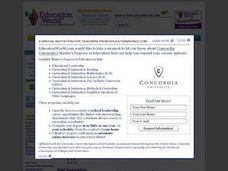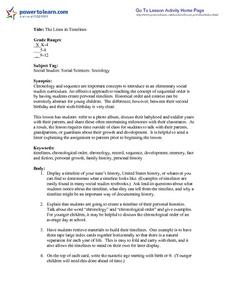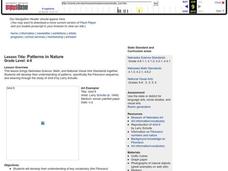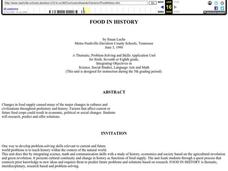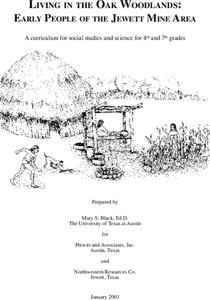Curated OER
Food for Thought
Learners understand the importance of each member of a food chain through a game. In this food chains lesson, students receive background information and then play a game to simulate what happens in the food chain of an endangered...
Curated OER
The Importance of Plants to Native Cultures in the Past and Present
Eighth graders investigate the founding and history of Sluice Boxes State Park. They use both primary and secondary resources to collect data. The focus is upon the use of native plants to make medicines. They write reports about several...
Curated OER
Make A Mummy: The Science of Mummification
Students research the history of mummification. They work together to create an apple mummy. They write a paragraph about what they gathered while doing the experiment.
Curated OER
Exploring Marine Ecosystems in the Caribbean and Maine
Students compare the marine habitats of Maine and the Caribbean using temperature, tides, ocean currents, latitude and longitude. In this marine ecosystems lesson, students analyze maps to complete graphic organizers that evaluate the...
Curated OER
The Lines in Timelines
Students are introduced to the concept of sequence by creating their own personal timeline. As a class, they put the events of the last week of their lives into the correct order and determine what information should be used for their...
Curated OER
Grand Canyon History Lesson
Students explore the history of the Grand Canyon. In this Grand Canyon lesson, students read "Grand Canyon National Park" by David Peterson and respond to questions regarding the piece. Students also create their own fossil models that...
Curated OER
Patterns in Nature
Students learn about artist Larry Schulte and view examples of his work. They create addition sentence for the first seven numbers of the fibonacci sequence and use unifix cubes to build that sentences. Students color and create three...
Curated OER
Weathervanes in the Wind
Students investigate wind and weather by creating a weathervane. In this environment lesson, students identify the purpose of a weathervane and observe weathervanes in action on their campus. Students create a weathervane and decorate...
Curated OER
Food in History
Students research, predict and offer solutions regarding factors that affect current or future food crops could result in economic, political or social changes.
Curated OER
Apple Science
Sixth graders explore agriculture by viewing a fruits and vegetables video clip. In this apple characteristics lesson, 6th graders discuss how fruits and vegetables deteriorate after being exposed to oxygen and identify methods to defend...
Curated OER
Living in the Oak Woodlands: Early People of the Jewett Mine Area
Learners examine the archeology and native peoples of the Jewett Mine area of Texas. Using a map, they explain the economic patterns of the native groups and how the geography of the area affected activities. They compare and contrast...
Curated OER
Two-Dimensional Drawings from Three-Dimensional Objects
Sixth graders identify and draw two-dimensional representations of a three-dimensional object. Students investigate the views of an object and determine that three views are required (front, one side and the top). Students use these...
Curated OER
Living in the Oak Woodlands: Early People of the Jewett Mine Area
Students are introduced to the early peoples living in the Jewett Mine area. After viewing transparencies, they view pictures of the mine today and its main area of production. For each picture, they develop symbols and captions about...
Curated OER
Why is there Pollution in Mexico City?
Learners explore the causes of air pollution in Mexico City from a holistic approach.
Curated OER
Ask an Expert-Grade 5-8
Students conduct oral histories about water in their community. They interview community members, create a class oral history journal, and record their findings on a school website, in the school or public library, or in another...
Curated OER
Developing Effective Social Policy for Change
Twelfth graders discuss current suffering, population, and food concerns in a poor area of the world. Next, 12th graders pretend that they are the leader of a country and are concerned about the future of the people. Students work in...
Curated OER
Photos from the Past-Grades 5-8
Students examine and interpret historic photographs of water use in New Mexico. They match captions to the pictures as to what they think the picture depicts. They research a topic represented by their photograph and write an extended...
Curated OER
Civil Society in Iraq
Students use core questions to learn about the concept of a civil society. The dynamics of the war in Iraq serve as an example of a society that is in turmoil. They also develop an imagined society organization that would help promote...
Museum of Tolerance
Developing Media Literacy
To protect young people from questionable content, many schools limit access. This resource suggests that because learners can so readily avail themselves to unrestricted Internet access, it is vital for 21st century learners to develop...
Curated OER
Winter Olympics History Year by Year
Investigate the history of the Winter Olympic Games. After researching this event and compiling necessary statistics, pupils use a graphic organizer to chart their findings. A template for a chart is included in this resource. Have your...
Curated OER
"Web of Life" Game
Learners relate members of an ecosystem by their interactions. In this ecosystem lesson, students toss a ball to other members of their group (each representing a member of an ecosystem) and tell how they are related to that member....
Curated OER
Animals, Animals, Everywhere
Fourth graders participate in a variety of activities dealing with animal characteristics and classifications in this multi-task lesson. They use graphic organizers, make booklets, and make models.
Curated OER
The Good, The Bad, and the Arctic
Young scholars investigate the social, economic and environmental consequences that might result from Arctic climate change. Students identify and discuss at least three consequences.
Curated OER
The Good, The Bad and The Arctic
Students examine the impact of a major climate change in the Arctic Ocean on the rest of the world. They use the Internet to research the Arctic region and the wildlife that lives there.




